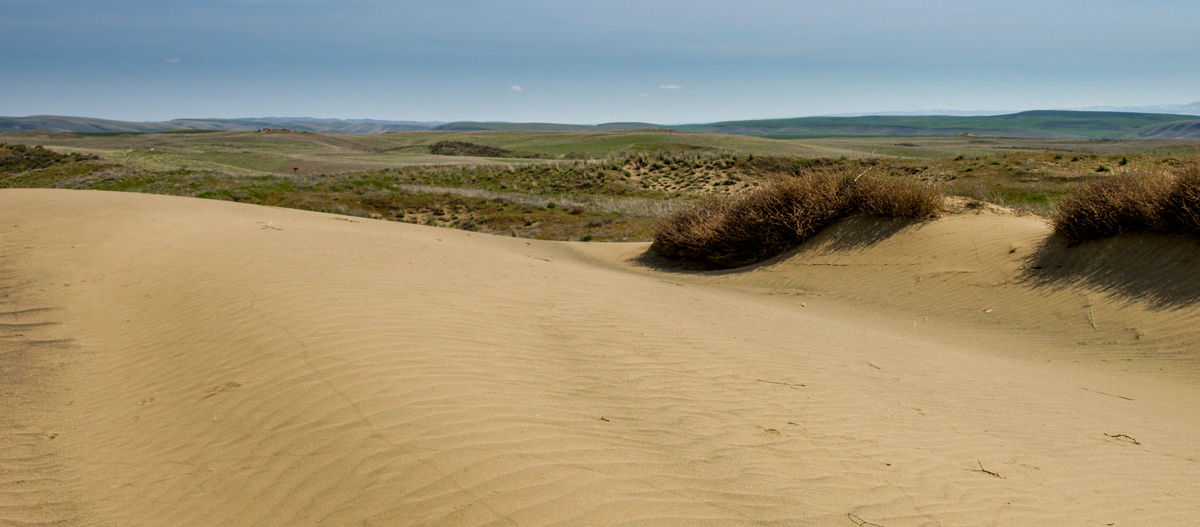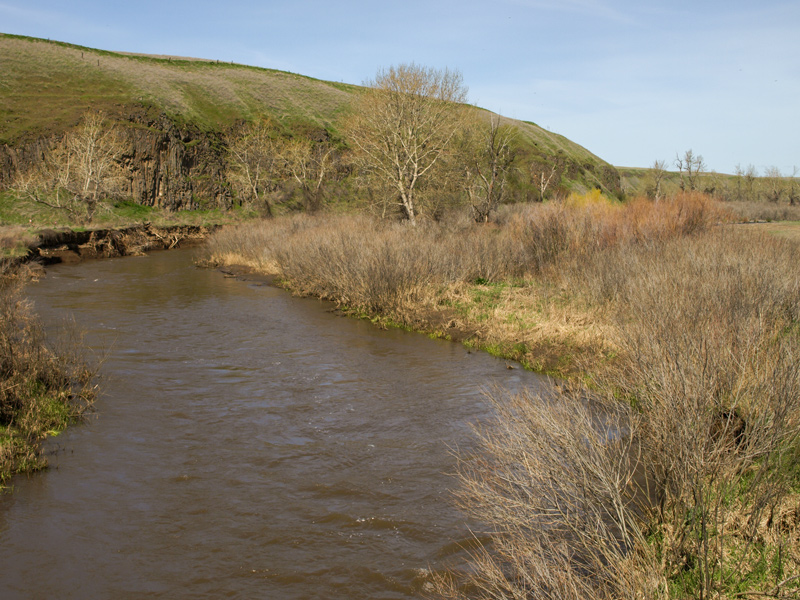After spending considerable time collecting horses, the expedition sets out on the Travois Road passing through plains abundant with sagebrush and sand dunes. They camp on the Touchet River north of present Walla Walla. Lewis describes eating dog, river otter, and horse among Walla Wallas. In Pittsburgh, several Indian delegates previously sent to Washington City by Lewis are stuck without a boat to take them home.
Looking for Horses
chilley and cold. the men went out for their horses . . . . about 11 A. M we got our horses up by the assistance of the Indians and Set out.
—John Ordway
Crossing the Plains
Sand Dune near the Touchet River
© 18 April 2009 by Kristopher K. Townsend. Permission to use granted under the Creative Commons Attribution-Share Alike 4.0 International license.
there are many large banks of pure sand which appear to have been drifted up by the wind to the hight of 15 or 20 feet, lying in many parts of the plain through which we passed today. this plain as usual is covered with arromatic shrubs hurbatious plants and a short grass. many of those plants produce those esculent roots which form a principal part of the subsistence of the natives.
Meriwether Lewis
Touchet River
© 18 April 2009 by Kristopher K. Townsend. Permission to use granted under the Creative Commons Attribution-Share Alike 4.0 International license.
Touchet River Camp
we encamped at the place we intersepted the creek where we had the pleasure once more to find an abundance of good wood for the purpose of making ourselves comfortable fires, which has not been the case since we left rock fort camp.
—Meriwether Lewis
Dog v. Otter v. Horse
Drewyer killed a beaver and an otter; a part of the former we reserved for ourselves and gave the indians the ballance. these people will not eat the dog but feast heartily on the otter which is vastly inferior in my estimation, they sometimes also eat their horses, this indeed is common to all the indians who possess this annimal in the plains of Columbia; but it is only done when necessity compells them.—
—Meriwether Lewis
Twenty-three Horses
our stock of horses has now encresed to 23 and most of them excellent young horses, but much the greater portion of them have soar backs.
—Meriwether Lewis
Indian Delegation Delayed
War Deptmt. Ap: 30. 1806.
Sir [James S. Swearingen],
By some mistake the direction for procuring suitable Boats for the Indians to descend the Ohio, and ascend the Mississippi, has taken a wrong direction. You will, with as little delay as practicable, furnish two suitable Keel Boats for the Indians who are now at Pittsburg—and you will furnish them with provisions suitable for their voyage.
You will please inform the Osage Chiefs, that their friend, left sick here, is alive, and that I have hopes of his recovery.
You will select for each of the Chiefs at Pittsburg, a musket . . . .
[Henry Dearborn][1]Lt. Swearingen was appointed assistant military agent at Fort Fayette in August 1805. Letters of the Lewis and Clark Expedition with Related Documents: 1783-1854, 2nd ed., ed. Donald Jackson (Urbana: … Continue reading
Weather Diary
State of weather at rise
Wind at rise
State of the weather at 4 P.M. Wind at 4 P.M. River cloudy after rain N. W. fair after cloudy N W fallen 2 in. rain slight.
—Meriwether Lewis[2]To assist the reader of this web page, the date column is not presented, the “State of the Columbia River” columns have been merged, and some abbreviations have been spelled out.
Travois Road is a High Potential Historic Site along the Lewis and Clark National Historic Trail managed by the U.S. National Park Service. The old trail stretches from the mouth of the Walla Walla River to the confluence of the Snake and Clearwater rivers. Sites include Lewis & Clark Trail State Park, The Encampment (Dayton, Washington), and Chief Timothy State Park.
Notes
| ↑1 | Lt. Swearingen was appointed assistant military agent at Fort Fayette in August 1805. Letters of the Lewis and Clark Expedition with Related Documents: 1783-1854, 2nd ed., ed. Donald Jackson (Urbana: University of Illinois Press, 1978), 307–08. |
|---|---|
| ↑2 | To assist the reader of this web page, the date column is not presented, the “State of the Columbia River” columns have been merged, and some abbreviations have been spelled out. |




